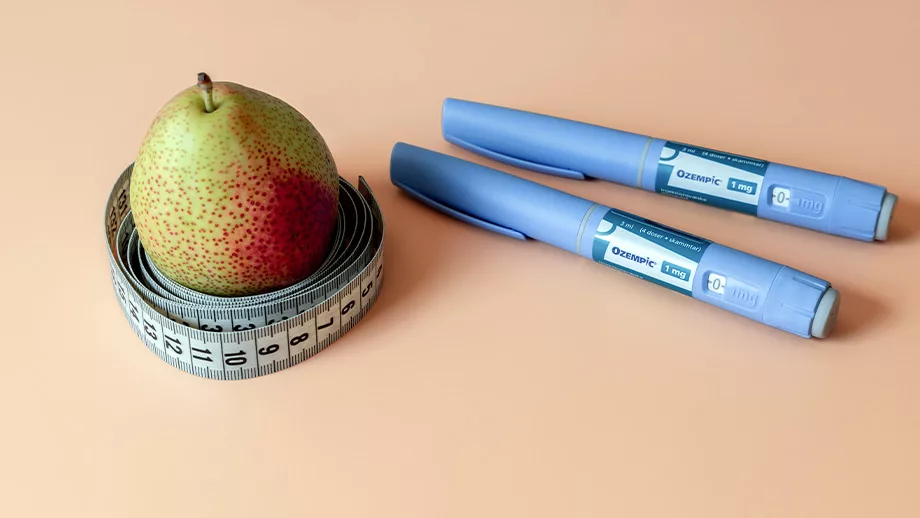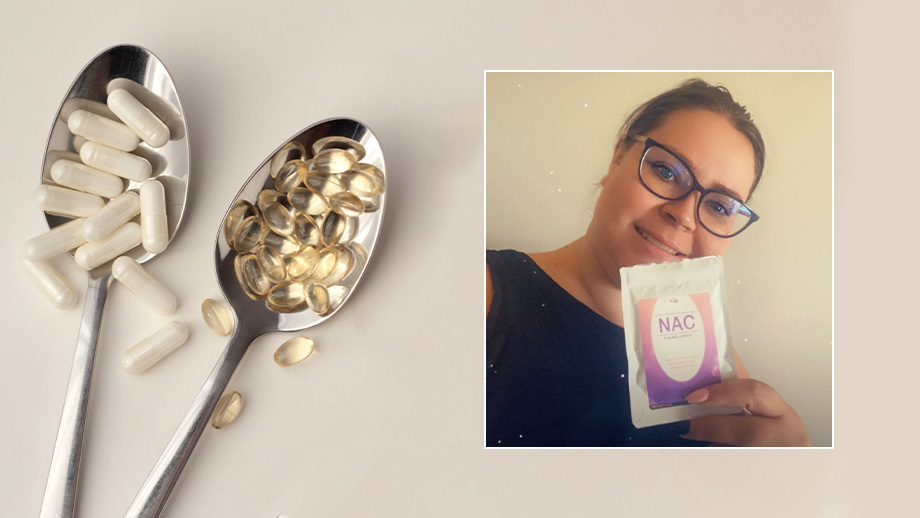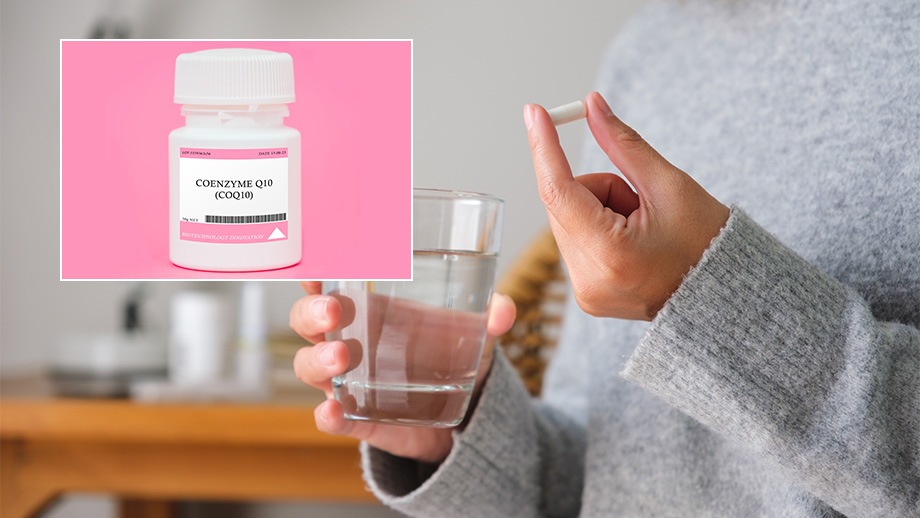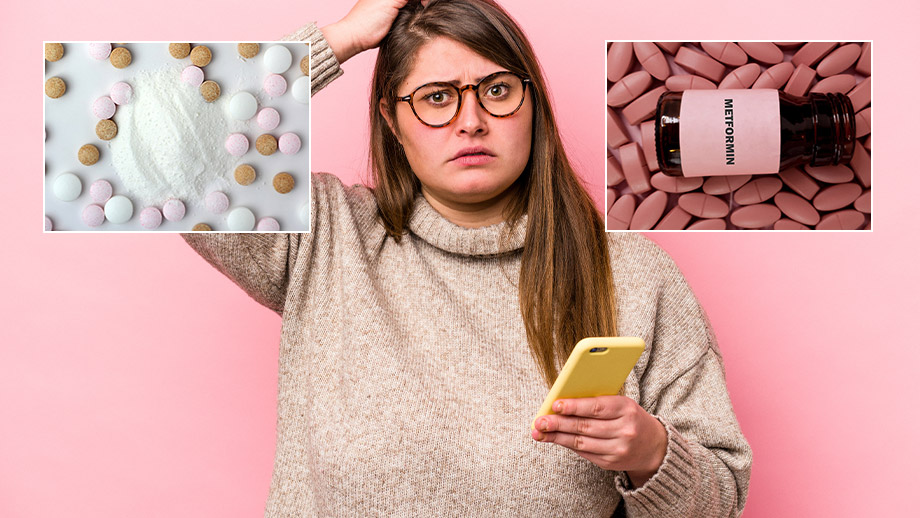Finding the best supplements for PCOS can feel overwhelming and confusing. Polycystic ovarian syndrome targets nearly your whole hormonal system, causing many symptoms. So narrowing down what you should treat can seem like a huge obstacle.
We have compiled a list of science-backed supplements that can alleviate and treat your PCOS naturally. Supplementation can be vital in an overall wellness plan for women with PCOS. So let’s get into the nitty-gritty.
How to Treat PCOS Naturally
Doctors will frequently prescribe hormonal birth control, metformin, or other medications for PCOS. But many of these mask the symptoms or have gnarly side effects and risks.
While these options can help some women, you may be ready to find natural alternatives that hit the root causes of this syndrome. That’s where the five SEEDS PCOS lifestyle framework comes into play.
The SEEDS acronym stands for:
S – Stress Reduction
E – Emotional Health
E – Exercise
D – Diet
S – Smart Supplementation
Though supplementation is last on the list, it doesn’t make it less important. Together, these seeds can grow into huge improvements in your overall health and wellness.
They each play a vital role in helping you treat your PCOS naturally. So today, we’ll get into why supplementation can help in that final lifestyle step.
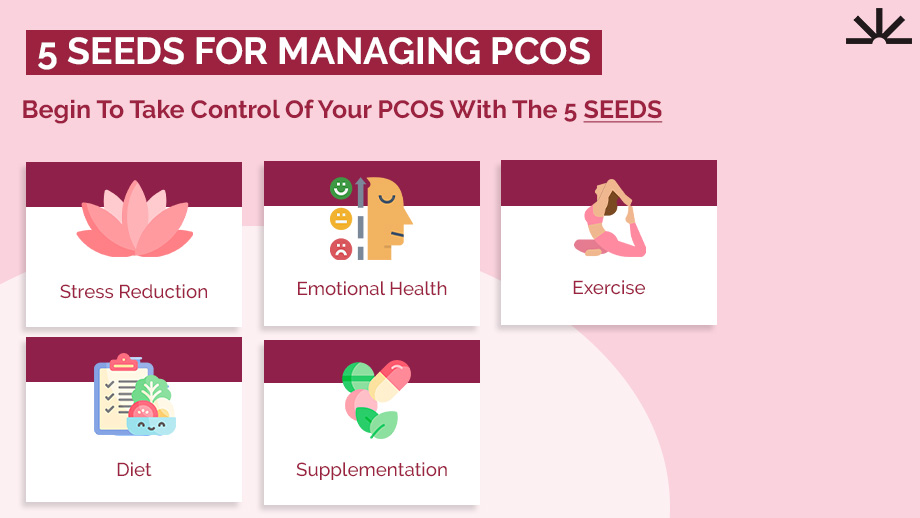
5 SEEDS For Managing PCOS
Why Take Supplements for PCOS
Due to the unique metabolic and hormonal imbalances caused by polycystic ovarian syndrome, your body may struggle to absorb vital minerals and vitamins. Many women with PCOS also suffer from vitamin deficiencies.
These deficiencies can lead to more hormonal problems and a heightened risk of further health complications such as cardiovascular disease. Smart supplementation is an essential step in improving your health.
Additionally, your doctors may even prescribe certain supplements in addition to medication, such as iron, magnesium, vitamin D, or vitamin B12. Too low levels of these can cause the body to not function properly and cause worsening health risks.
The Best Supplements to Treat Your PCOS Symptoms
You may feel a little skeptical if you’ve never tried supplements before. But these are all backed by lots of research specific to treating PCOS. And as they are naturally derived, you may feel less hesitant to try them.
We’ll explain what it is, what it is best for, and other important information. Take note of what PCOS symptom you most need help with and see if any of these supplements may work for you.
1. Inositol

Inositol For PCOS / Adobe Stock
Best for: Insulin resistance and ovulation.
When to take it: Take it on an empty stomach in the morning or before bed.
Recommended dose: Many women start taking 3 to 4 grams daily, but you can take 6 to 7 grams per day.
Safety: You can take inositol when pregnant, breastfeeding, or trying to conceive.
About: Inositol has two main variants out of nine: Myo-inositol and D-chiro-inositol. They come naturally in fruits and beans. Inositol acts as a messenger for hormones like insulin and follicle-stimulating hormone, which play a role in PCOS.
According to a study in the National Library of Medicine, low levels of d-chiro-inositol can lead to insulin resistance. But supplementing with inositol can have an insulin-sensitizing effect on your cells. Meaning it can help treat insulin resistance by unlocking the cell door to allow glucose to function properly.
Additionally, high levels of myo-inositol in your system promote healthy and mature ovulation. And myo-inositol can convert into the d-chiro form in the body. So taking myo-inositol can lower insulin resistance and promote healthy ovulation and, in turn, regular periods. It can also improve weight gain, poor energy, and cravings.
Importantly, a recent 2023 study showed that inositol worked just as well as metformin for treating insulin resistance in PCOS.
However, inositol doesn’t have as many gastrointestinal side effects as metformin does and is a natural supplement. Many who can’t tolerate the side effects of metformin find inositol just as effective and easier to take.
2. Berberine

Berberine For PCOS / Adobe Stock
Best for: Reduces insulin resistance and aids in belly fat loss and ovulation.
When to take it: In the morning before breakfast.
Recommended dose: 500 to 1,500 milligrams daily.
Safety: You can take berberine when trying to conceive but stop taking it when pregnant and breastfeeding.
About: Berberine is a chemical that comes from plants such as the barberry. Chinese and herbalistic medicine have used it for thousands of years for heart problems and inflammation.
A meta-analysis study showed berberine helped reduce insulin resistance, cholesterol, and inflammation. It also lowered visceral (or deep stomach) fat and improved ovulation cycles. Out of the five studies reviewed in the analysis, berberine improved many facets of PCOS.
Additionally, compared to metformin and myo-inositol, berberine had better results at lowering waist circumference and androgens. Supplementing with berberine can help your PCOS symptoms and have great overall health benefits.
3. N-Acetyl Cysteine (NAC)

NAC Capsule / Adobe Stock
Best for: Reduces insulin resistance and inflammation and improves fertility.
When to take it: In the morning.
Recommended dose: 500 to 1,500 milligrams a day.
Safety: You can safely take NAC when trying to conceive, pregnant, and breastfeeding.About: Amino acids help build proteins used throughout the body. N-acetyl cysteine comes from the amino acid L-cysteine. It converts into glutathione, one of the most powerful antioxidants.
About: Amino acids help build proteins used throughout the body. N-acetyl cysteine comes from the amino acid L-cysteine. It converts into glutathione, one of the most powerful antioxidants.
Antioxidants work to fight harmful compounds in the body. You can find cysteine naturally in high-protein foods, but N-acetyl cysteine is a derivative.
In a meta-analysis of 910 women, NAC helped lower chronic levels of inflammation and improve ovulation and pregnancy rates. Additionally, compared with metformin and the placebo group, NAC reduced BMI, total testosterone, and fasting blood glucose in women with PCOS.
4. Zinc

Zinc For PCOS / Celt Studio
Best for: Hirsutism, high androgens, and ovulation.
When to take it: You can take this between meals unless it causes stomach upset, in which case you can take it with food.
Safety: You can take zinc when pregnant and breastfeeding in healthy doses.
Recommended dose: For women, a daily dose of 8 to 12 milligrams a day is considered safe. But this may be insufficient for women who have a deficiency. We recommend 20 milligrams daily for women with PCOS. Consult with your doctor, who can prescribe a higher dose.
About: Zinc plays a crucial role in cell function, especially in the reproductive and endocrine systems. But most of the world’s population doesn’t consume enough zinc in their diet. You can find it in eggs, nuts, red meats, seeds, and dairy products. Zinc deficiency can lead to type 2 diabetes, obesity, ovarian issues, stress, and inflammation.
Supplementing with zinc for PCOS helps regulate androgen levels by stopping the conversion of testosterone. Zinc is also involved in follicle development, ovulation, fertilization, and pregnancy.
A study published in the National Library of Medicine showed supplementing with zinc can also significantly help with facial hair growth and hair loss in women with PCOS.
5. Magnesium

Magnesium For PCOS / Adobe Stock
Best for: Insulin resistance, inflammation, and energy.
When to take it: Anytime
Recommended dose: For women, 300 to 400 milligrams of magnesium daily can help support healthy levels.
Safety: You can take magnesium when pregnant in small amounts, but is generally safe when breastfeeding and when trying to conceive.
About: Magnesium plays a crucial role in many bodily processes because it supports healthy hormones, stress, sleep, blood sugar balance, and mental health. And the only way to get this necessary mineral is through diet or supplementation.
Unfortunately, insulin resistance and PCOS cause women to lose magnesium leading to a deficiency and making supplementation important.
Magnesium improves insulin resistance, balances androgens, helps regulate your mood, promotes better, deeper sleep, and improves energy and fatigue.
Additionally, it can help lower inflammation, stabilize blood sugar, and improve anxiety. A study also showed that it improved testosterone and BMI.
Good food sources include avocados, almonds, cashews, dark chocolate, legumes, chai seeds, pumpkin seeds, tofu, or salmon. But as part of your smart PCOS supplement plan, you can take magnesium citrate or glycinate, which your body can easily absorb.
6. L-Carnitine
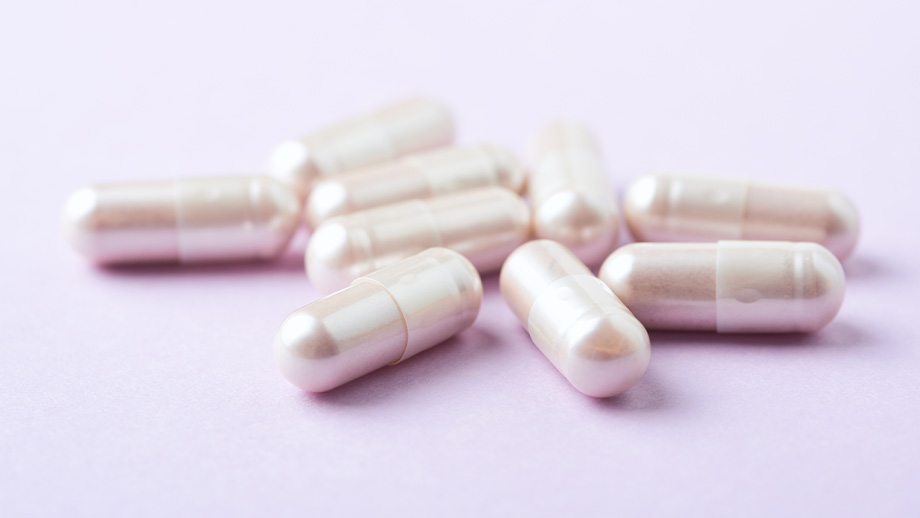
L-Carnitine Capsules For PCOS / Adobe Stock
Best for: Reduces insulin resistance and BMI.
When to take it: In the morning or prior to a workout.
Recommended dose: 500 to 1,500 milligrams.
Safety: You can safely take L-carnitine when pregnant and breastfeeding.
About: The chemical compound carnitine comes from the brain, liver, and kidneys. It helps convert fat into energy and promotes a healthy metabolism. It can support healthy brain, muscle, and heart function.
Women with PCOS may have decreased carnitine levels. Additionally, some studies show a correlation between low carnitine in PCOS and high insulin. If you have low natural carnitine levels, you can supplement with L-carnitine to improve your insulin sensitivity.
A meta-analysis of nine studies also showed that L-carnitine improved lipid, cholesterol, and blood sugar levels and lowered body mass index. Importantly this supplement can help improve energy and combat fatigue that many women with PCOS experience. You can take L-carnitine to help with insulin resistance, lose weight, and increase energy.
7. Saw Palmetto

Saw Palmetto Leaves / Adobe Stock
Best for: Hirsutism and high androgens.
When to take it: Anytime with food.
Recommended dose: 160 to 320 milligrams a day.
Safety: You can take saw palmetto when trying to conceive but not while pregnant or breastfeeding.
About: Saw palmetto trees grow in the southeast regions of the United States, Bahamas, and Cuba. This supplement works as an anti-androgen that can block the conversion of testosterone into the more potent DHT.
Women with PCOS who may experience facial hair growth or hair loss may benefit from saw palmetto. It can also help reduce acne and oily skin, which high androgens often cause. However, you should avoid taking it if pregnant or breastfeeding.
8. Vitamin D
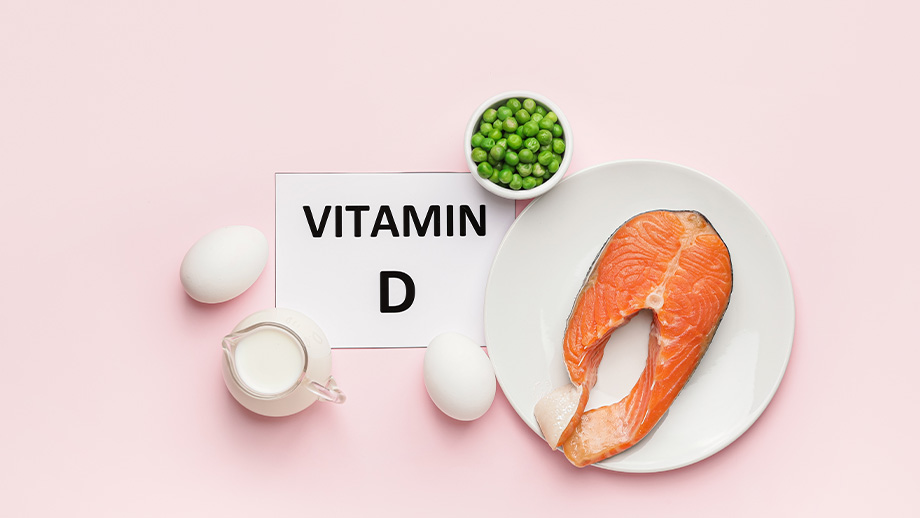
Vitamin D For PCOS / Adobe Stock
Best for: Reduces insulin resistance and improves ovulation.
When to take it: Anytime with a meal.
Recommended dose: 800 to 1,000 IUDs.
Safety: You can safely take up to 4,000 IUDs of vitamin D per day during pregnancy and breastfeeding.
About: Many people want to soak up some vitamin D at the beach, but the sun isn’t the only way our body can produce this necessary nutrient. Half of the world’s population actually has an insufficiency. And 65% to 87% of women with PCOS have vitamin D deficiency.
It may alarm you further that vitamin D deficiency is linked to cancer, fatigue, frequent illness, bone loss, depression, and hair loss.
Vitamin D is actually a hormone produced in the body that we can also get from food. It plays an essential role in the body, from cell growth, metabolism, immune system, inflammation, and calcium absorption.
Additionally, it leads to a balance of insulin levels and regular ovulation and menstrual cycles. It can also have anti-inflammatory effects.
Supplementing with vitamin D can help many factors of PCOS. You can also get better absorption when taking vitamin D3 with magnesium. However, if you have a deficiency, your doctor can recommend the best dosages.
9. Vitamin B-12

Vitamin B12 For PCOS / Adobe Stock
Best for: Mood, energy, and insulin resistance.
When to take it: Take it 2 hours after a meal or 30 minutes before a meal.
Recommended dose: 2.4 mcg for adults per day.
Safety: You can safely take vitamin B-12 when pregnant and breastfeeding.
About: Vitamin B-12 plays an important role in red blood cell formation, metabolism, nerve function, and many other processes. You can find it in dairy, fish, meat, poultry, and eggs.
Women with PCOS have a higher risk of Vitamin B-12 deficiency. According to the Mayo Clinic, “Vitamin B-12 deficiency can lead to anemia, fatigue, muscle weakness, intestinal problems, nerve damage and mood disturbances.”
Additionally, taking metformin can lead to a vitamin B-12 deficiency. But taking this supplement for PCOS can help improve insulin sensitivity, mood, and energy and lower inflammation. Ask your doctor if you have a deficiency, especially if you take metformin to treat your PCOS.
10. Omega-3s

Omega-3 Fatty Acids For PCOS
Best for: Reduces insulin resistance and inflammation.
When to take it: Anytime with a meal.
Recommended dose: 250 to 500 milligrams of combined EPA and DHA.
Safety: DHA omega-3 is important during pregnancy. This is a safe supplement to take when trying to conceive, pregnant, and breastfeeding.
About: You can find omega-3 fatty acids in food such as salmon, chia and flax seeds, walnuts, and plant oils. Your body especially needs the EPA and DHA forms of omega-3 for good heart, lung, immune, and hormonal health.
A meta-analysis of nine trials found that it can improve the body’s sensitivity to insulin and reduce inflammation and cholesterol. In addition, it can help improve BMI by targeting stubborn belly fat.
Omega-3 can also lower the effects of testosterone. It works by increasing levels of sex hormone-binding globulin (SHBG). This protein attaches to testosterone in your bloodstream rendering it inactive. If you don’t consume enough of this fatty acid from your diet, this supplement can improve many aspects of your PCOS and overall health.
How to Know Which Supplements to Take?
Are you feeling a little overwhelmed by how many supplements you can take for PCOS? It can feel quite confusing knowing where to start. Maybe you even want to take all of them. However, you can overdo it, especially if you take several multivitamins.
First, you need to narrow down exactly what values you don’t get enough of. Next, look at the ingredients. Some may contain additives or allergens. And when combined with others, they may even block your ability to absorb the nutrient you need.
Then track how much you consume so you don’t accidentally exceed the recommended daily dosages. Taking too much can have negative health effects. If you have questions about how much you should take, consult your doctor.
Next, consider the quality and cost. Low-cost supplements will likely have a lower quality which may not be as effective in your body. You also don’t want to overspend on specialty supplements that overclaim their benefits.
Finally, visit your doctor to know which supplements you should take to treat your PCOS naturally. Your doctor can do blood tests to help you know what deficiencies you have and if you have insulin resistance.
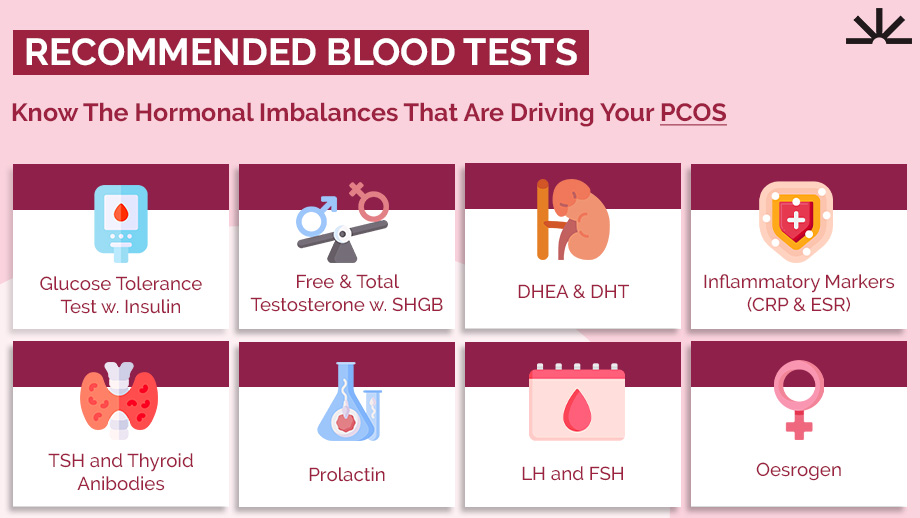
PCOS Blood Tests
You can also ask your healthcare provider about specific supplements you want to take, if they would help, and what dosage they recommend.
Can You Take Several Supplements at a Time?
You can often take several supplements at a time. However, ensure you don’t double up on certain ones. Check the ingredients and track your dosages. For example, some vitamin D supplements also contain magnesium for better absorption. If so, you may not need to take additional magnesium.
On the other hand, some supplements taken together can cancel each other out and block its absorption. For example, green tea and iron don’t work well together. You should also take calcium and magnesium two hours apart, even though you need both for optimal health.
So, yes, you can take several supplements at a time, but be aware. Know what time of day to take them, which ones work well together, and how much you need.
We recommend starting with two or three at a time. Also, consult with your doctor. If you have deficiencies, they may give you specific instructions on how to take your supplements.
And you don’t want to spend money on supplements you don’t need. Taking more than five can be risky and expensive.
Is There an All-in-One PCOS Supplement or Multi-Vitamin?
You likely won’t find an all-in-one PCOS supplement to treat every single symptom. However, you can find a few multivitamins that treat a few targeted facets of PCOS.
For example, the Balance (Multivitamin) contains myo-inositol, magnesium, vitamin C, zinc, chromium, and many other vitamins and minerals.

Balance (Multivitamin) By H&B Vitamins
Balance can help manage insulin resistance, menstrual regulation, energy, and other hormonal imbalances. This unique blend is safe while trying to conceive, pregnant, or breastfeeding. It’s also vegetarian and vegan-friendly. Take a look at the hundreds of reviews that earned it a 4.8-star rating.
However, you can also find many other multivitamin blends on the market. They may target specific aspects such as high androgens, hirsutism, mood and energy, sleep, metabolism and weight, and more.
How Long Should You Take Supplements for PCOS?
It may take six months or more to start to notice the benefits of PCOS supplements. With others, you may enjoy the benefits more quickly.
For many supplements, you should take them year-round, especially if you have a deficiency. It can take longer for the body to correct it and restore normal levels. Thus longer supplementation may be necessary.
You can have regular check-ups with your doctor to monitor your blood work and see any improvements.
Where to Purchase Supplements for PCOS?
You can find many of these supplements in your local pharmacy or drugstore. You can also purchase them online. When shopping, buy from trusted brands that have good reviews.
You can find many supplements listed above in the Health and Balance Vitamins online store. They ship worldwide from three countries. You can also buy bundle packs and subscribe to save, so you don’t have to worry about ordering whenever you run out.
Try our research-driven supplements, formulated for the unique needs of women with PCOS.
Carefully crafted vitamins that combine the latest science with inspiring results. Supporting hormonal & metabolic health in those who need it most*. With over 2,800 positive reviews.
Find the right supplement for you
Is Taking Supplements for PCOS Worth It?
Taking PCOS supplements can have huge benefits for your health and symptoms. You may experience less facial hair, better energy and mood, fewer cravings, and more. And if you don’t want the side effects and hassle of prescription medication, you can find better alternatives.
Many of these supplements work just as well as their prescription counterparts. Many people find adding smart supplementation to their lifestyle can greatly benefit their PCOS.
Which of these PCOS supplements do you want to try?



